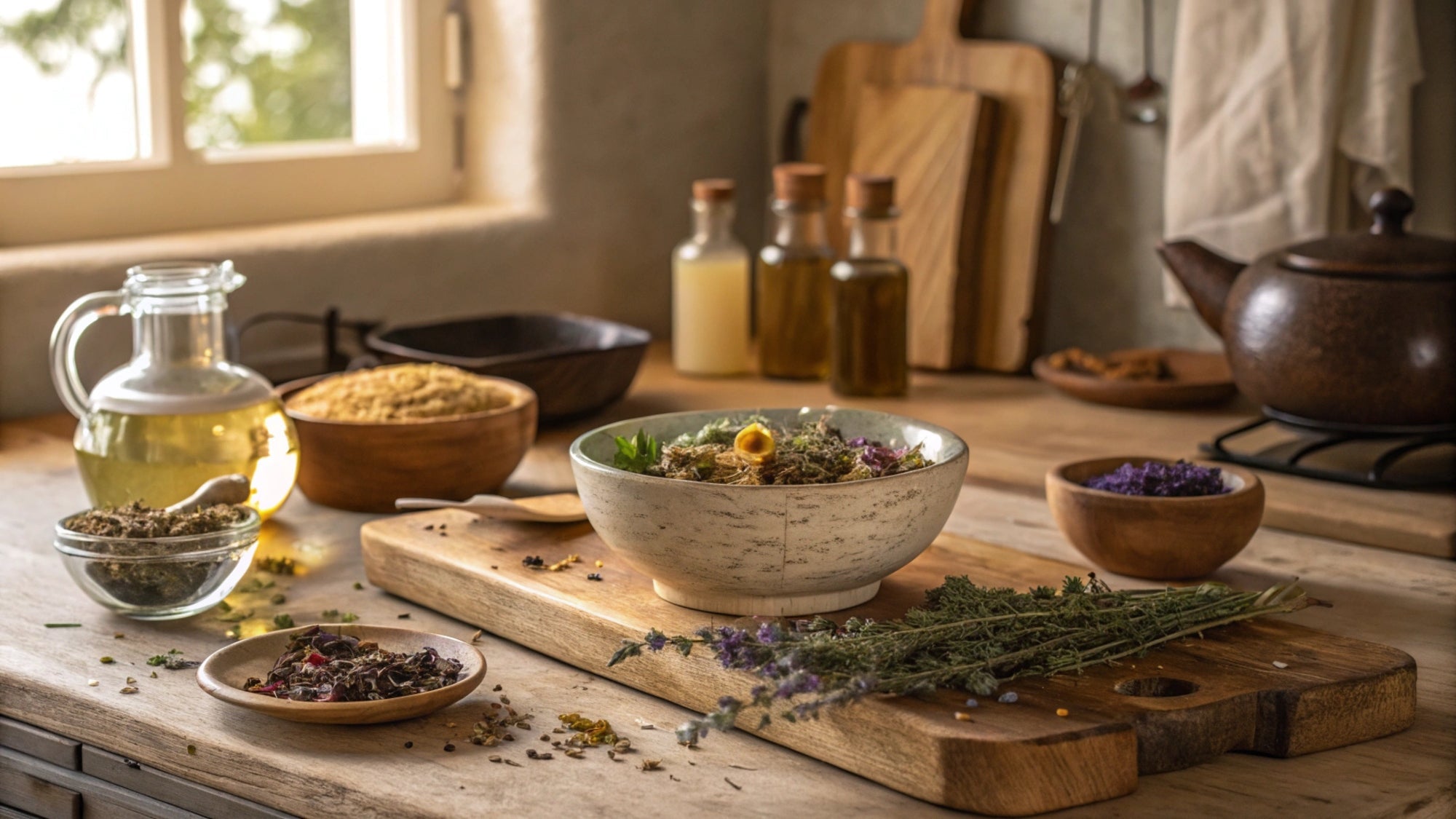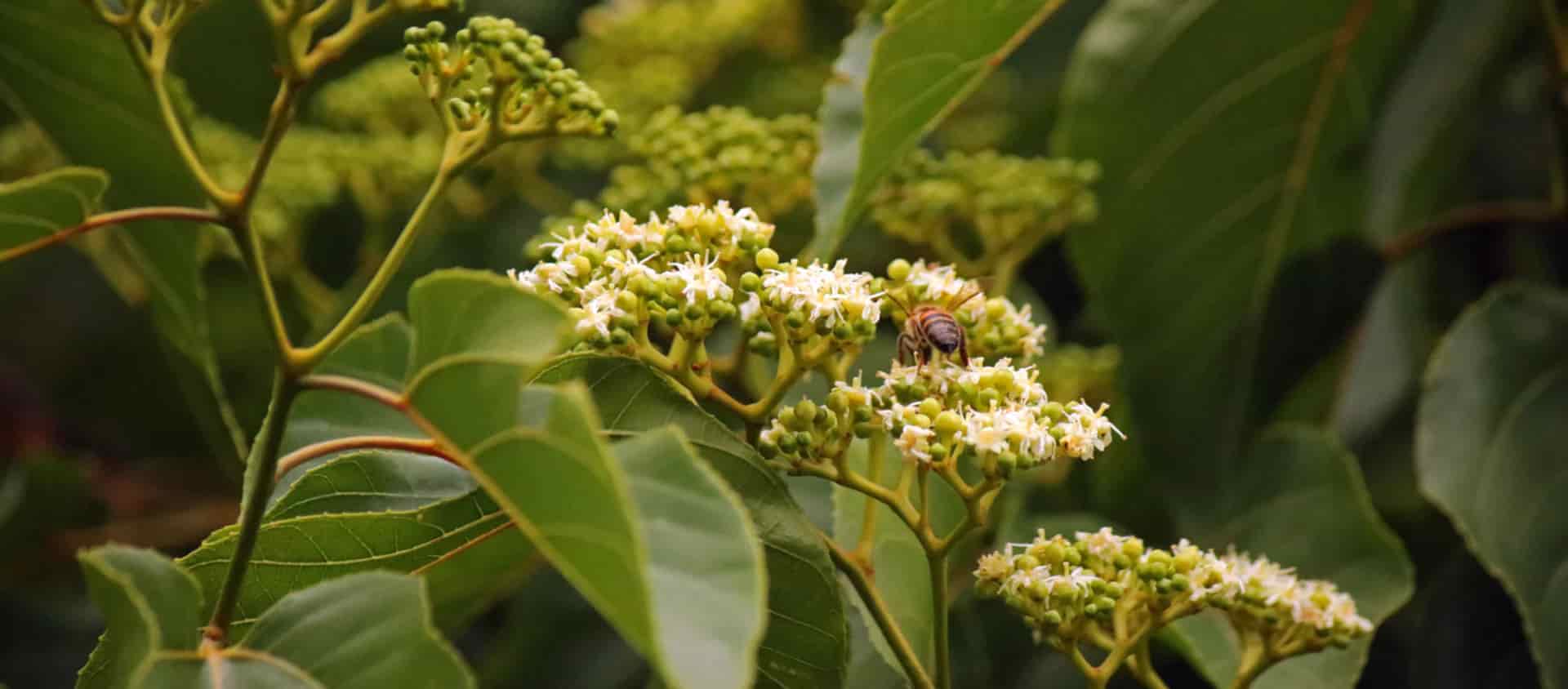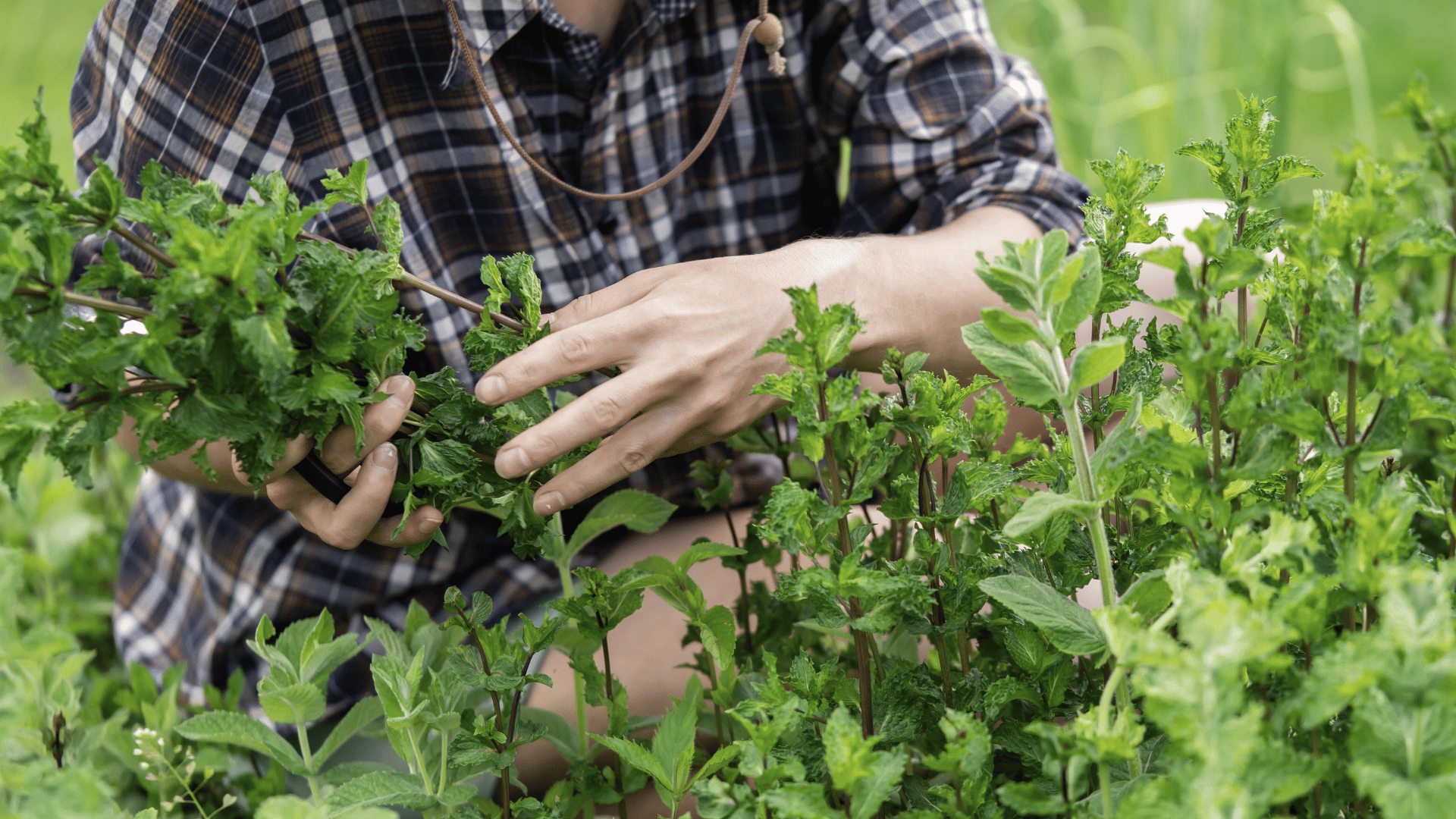
Yarrow Plant Health Benefits: The Medicinal Uses of Achillea Millefolium
Written by Rebecca Younger, CH, CDShare
Yarrow, known scientifically as Achillea millefolium, is a resilient herb with deep roots in history and healing. Native to Europe and Asia, it has since made itself at home across North America, thriving in meadows, fields, and roadsides with quiet tenacity. Its long-standing reputation in traditional medicine is reflected in nicknames like “Old Man’s Pepper” and “Nosebleed,” both nodding to its practical uses over centuries. And, of course, there’s its legendary connection to Achilles, who is said to have used yarrow to treat wounds on the battlefield—a fitting tribute to a plant that’s as practical as it is enduring.
With its finely feathered leaves and clusters of delicate flowers, yarrow may appear modest, but it’s anything but. Towering up to three feet, it attracts pollinators while offering benefits that range from boosting immunity to supporting skin health. It has also found its place in spiritual traditions, symbolizing protection and healing. Whether steeped in a tea, used as a tincture, or applied topically as a compress, yarrow continues to stand tall as a trusted ally in natural wellness, quietly proving that the most powerful remedies are often the simplest
A Versatile Herb with Historical Uses
Drought-resistant and capable of growing up to 36 inches, yarrow has earned the Spanish nickname “Plumajillo” (little feather) for its delicate, feathery leaves. Its tiny flowers bloom between May and August, forming dense white or pink bunches at the top of sturdy stems.
Not only does yarrow support nearby plants by boosting their resilience to pests, but cavity-nesting birds like starlings even line their nests with yarrow to help fend off parasites. Butterflies and ladybugs love it too! Both the flowers and leaves can be harvested and dried for teas or washes to ease skin irritations and soothe bug bites. The fresh herb is a popular addition in salves due to its volatile oils and resins, which promote skin healing and can ease joint discomfort. Yarrow’s essential oils contain microbial balancing properties ideal for healing cuts and burns, while its tannins and silica work as an astringent to help tissues recover.
Medicinal Uses of Yarrow
Yarrow, a versatile and time-honored medicinal herb, has been valued for its wide range of healing properties throughout history. Renowned for its ability to ease bleeding and promote wound healing, Yarrow continues to be a staple in natural medicine. Its inflammatory soothing and microbial supporting properties make it beneficial for treating minor skin irritations and supporting overall immune health.
Discomfort Release and Wound Healing
Salicylic acid has earned its spot as a natural MVP for soothing neck and head tension. Think of it as your body's quiet ally, stepping in to support a healthy inflammatory response and taking the edge off discomfort from head tension or creaky joints. But this powerhouse doesn’t stop there—it’s also nature’s answer to toothache troubles. Found in certain plant leaves, salicylic acid can be chewed to deliver its calming properties straight to the source of discomfort. It’s like nature’s version of a quick fix, giving you a moment of relief right when you need it.
Digestive Support
Yarrow’s impressive resume includes calming digestive complaints and promoting vascular health, among other benefits. With effects that include boosting circulation and supporting healthy blood pressure levels, this herb shines in teas, tinctures herbal extracts, and other applications.
- Supports detoxification by enhancing sweating
- Promotes circulation and blood pressure balance
- Offers wound healing support
- Alleviates cold symptoms naturally
Adding yarrow to your health routine can provide gentle, effective support to keep your body in balance.
Women's Health
Yarrow tea has long been a trusted ally for women’s wellness. Known for its hormone-balancing effects, it’s a comforting addition to any herbal regimen.
- Hormonal Balance: Helps regulate menstrual cycles and ease PMS symptoms
- Immune Support: Keeps seasonal colds at bay
- Stress Relief: Helps ease tension and uplift the mood
This potent plant provides natural support for women’s health through all stages of life, making it an ideal go-to for self-care.
Nervous System Support
Yarrow is rich in flavonoids, free radical scavengers known to combat oxidative stress. Its calming effects make it a supportive herb for the nervous system, particularly for those dealing with chronic stress. This herb is a gentle companion for calming the mind and encouraging restful sleep.
Synergistic Herb Combinations with Yarrow
Yarrow works beautifully with other herbs to create a balanced, powerful wellness support system. Here are a few dynamic herb combinations to consider:
- Echinacea: Combine with yarrow for a stronger immune defense, especially during cold season.
- Peppermint: Adds cooling relief to yarrow’s inflammatory soothing benefits, soothing the digestive system.
- Chamomile: Supports relaxation and calms the nerves, pairing well with yarrow’s gentle stress-relieving effects.
Together, these herbs create a balanced, versatile blend for health and wellness, enhancing each other’s strengths.
How to Use Yarrow
Yarrow is easy to incorporate into your herbal routine in a variety of ways:
- Teas: Brew dried yarrow flowers or leaves for a soothing herbal tea.
- Tinctures: Yarrow tinctures are a concentrated way to enjoy its benefits, often taken in small doses.
- Ointments and Salves: Yarrow is a great addition to topical applications for cuts, bruises, or inflamed skin.
Suggested Use: While using yarrow extract is safe in moderation, start with small doses, especially if you’re new to using it. Consult an herbalist or healthcare provider to ensure the benefits of yarrow complements your health plan.
The Power of Liquid Herbal Extracts
Why choose liquid herbal extracts over other forms? These concentrated tinctures offer several advantages that make them a superior choice for herbal supplementation:
- Fast-Acting Benefits: Liquid extracts bypass the digestive process required for breaking down pills or capsules, allowing for quick absorption directly into your bloodstream.
- Superior Absorption: Your body can absorb liquid herbs more efficiently than solid forms, making more of the beneficial compounds available for use.
- Easy to Customize: Liquid extracts are simple to adjust for your needs.
- Long Shelf Life: When properly stored, liquid herbal extracts maintain their potency for extended periods.
Growing and Harvesting Yarrow
Growing yarrow is a rewarding endeavor, as this hardy plant thrives in a variety of conditions. Yarrow prefers full sun to partial shade and well-drained soil, making it suitable for zones 3-9. You can start yarrow from seeds or seedlings, spacing them 12-18 inches apart to allow for healthy growth. The plant typically blooms from mid-summer to early fall, producing beautiful flowers that can be harvested for medicinal use. Both the leaves and stems are valuable for making herbal teas or tinctures. Yarrow can be grown in containers or directly in the ground and can be propagated through division or seed. To harvest yarrow, simply cut off the flowers or leaves with scissors or pinch them off with your fingers. Ensure the harvested yarrow is thoroughly dried before storing it for future use. With its ease of cultivation and myriad health benefits, yarrow is a wonderful addition to any herbal garden.
As you explore the myriad benefits of the yarrow plant, consider cultivating your own patch of this versatile herb. Not only will it enhance your garden's biodiversity, but it may also inspire a deeper connection with nature’s healing gifts. Incorporating yarrow into your daily routine can be a small yet powerful step toward embracing natural wellness and holistic living. Let this ancient plant guide you on a path of health and balance, rooted in tradition and flourishing in modern life.
WishGarden Products Featuring Yarrow

At WishGarden, we capture the power of yarrow in several of our wellness formulas:
- Kick-Ass Immune: Helps your immune system stay strong and resilient
- AfterEase For After Birth Contractions: Soothes after birth contractions
- Badass Bitters: Supports healthy digestion and enzyme production
- Deep Lung & Bronchial Support: Support healthy lungs and open airways
- Happy Ducts: Promotes lymphatic movement, immune health, and milk flow
- ReBalance After Birth Hormonal: Supports hormone balance post-birth
- Serious V-Fighter: Strengthens immune defenses
- Cycle Harmony Hormone Support: Supports balanced hormones and cycle regularity
Herbalist Q&A: Yarrow
Q: Can I drink yarrow tea every day?
Yes, you can enjoy yarrow tea daily, but moderation is key. Drinking yarrow tea each day can support digestion, immune health, and hormonal balance. However, it’s best to take breaks after several weeks to allow your body to reset, which is a good practice with many herbs. Yarrow’s astringent properties can be potent, so keep your servings moderate, and consult a healthcare provider if you’re new to taking yarrow, or have any health conditions.
Q: Why is yarrow called “devil's nettle”?
Yarrow’s nickname “devil’s nettle” comes from its long history and association with both healing and protective folklore. Traditional beliefs held that yarrow could ward off evil spirits, and it was often used in protective charms. Its powerful medicinal properties and pungent aroma earned it a slightly edgy reputation, leading to the name “devil’s nettle.”
Q: How did Native Americans use yarrow?
Native American tribes valued yarrow for its wound-healing and inflammatory support. They used it to ease bleeding, soothe joint discomfort, and support the immune system by applying crushed yarrow leaves to wounds and bruises. Some tribes also brewed it as a tea to soothe respiratory and digestive issues. For generations, yarrow was an essential part of their natural medicine toolkit, valued for its versatility and healing effects.
Q: What does yarrow do for hair?
Yarrow can support scalp health and hair vitality. Its microbial supportive properties help keep the scalp balanced, reducing dandruff and skin irritation too. You can rinse your hair with diluted yarrow tea or add a few drops of yarrow root tincture to your shampoo. This gentle herb tones the scalp, which may contribute to stronger, healthier hair over time.
Q: What does yarrow do for your gut?
Yarrow is a well-known digestive aid with several gut-supporting properties. It’s particularly helpful for soothing digestive discomfort, such as bloating, gas, and cramping. Yarrow’s astringent properties help tone the digestive tract, which can aid in calm inflammation in the stomach and intestines. Its ability to stimulate healthy bile and blood flow, also promotes better digestion and absorption of nutrients, making it a valuable herb for overall gut health.
Rebecca Younger is passionate about herbs and women's health. She aspires to plant seeds of inspiration within her community about plant medicine and healthier ways of life. She studied Herbal Medicine at Herbalism Roots in Denver and is a certified Doula through the Matrona Foundation. She is the Brand Communications Specialist at WishGarden Herbs.
For educational purposes only. This information has not been evaluated by the Food and Drug Administration. This information is not intended to diagnose, treat, cure, or prevent any disease, or to sell any product.


















